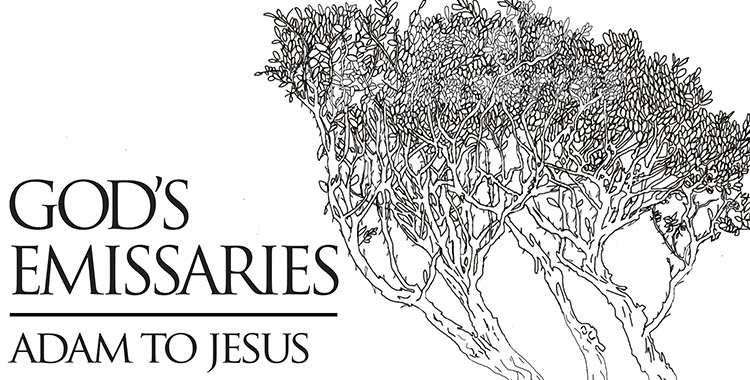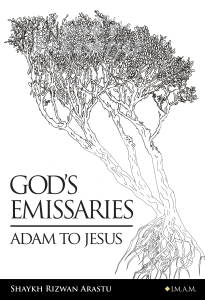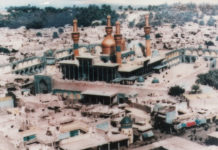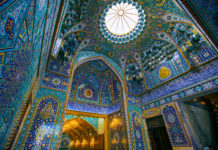The following is an excerpt from the book, God’s Emissaries: Adam to Jesus, penned by Shaykh Rizwan Arastu and published by the Imam Mahdi Association of Marjaeya (I.M.A.M.). The excerpt touches on some of the details of Adam’s creation understood from the traditions of the Prophet (s) and the Imams (a). A copy of the book can be obtained at the Islamic Texts Institute.
Dust to Make the Vicegerent
God decided that his vicegerent over the material world should be made of the material world. In particular, he wished to make him out of dust.[23] When he informed the earth that he would make a race of creatures from her dust and that these creatures would have the freedom to choose their actions—that some would choose to obey their creator and some would choose to sin, the earth shuddered.[24] She begged God not to make of her dust a creature that could potentially sin and then burn in hellfire. God assured her that his will would be done notwithstanding her reservations.[25]
He sent Archangel Gabriel with the task of gathering the dust. However, when he descended to collect it, the earth pleaded with him to give her respite so that she could beg God once again not to use her earth for this creature. God heard her cries and told Gabriel to return to the skies without taking her dust. In turn, God sent Archangels Michael and Seraphiel, and they met with a similar obstinacy. Then, when Archangel Azrael descended, the earth protested again, but Azrael said, “My Lord has commanded me to do something. I shall fulfill this duty whether you like it or not.”[26]
The earth renewed her protests saying, “God forbid that you take my dust.”
Azrael retorted, “God forbid that I return to him not having fulfilled my duty.”[27] With that, he proceeded to gather earth of different colors: white, red, brown, and black; of different temperaments: rocky, soft, sweet, and salty.[28] Then he gathered different kinds of water: fresh, salty, bitter, and putrid. From these varieties of earth and water, God would eventually create a diversity of colors and temperaments in his new creature.[29]
When Azrael had collected the dust and water as God had prescribed, God told him, “Just as you successfully seized this dust from the earth despite her resistance, from this day forward, you shall have the honor of seizing the souls of all my creatures at the time when I ordain their death.”[30] From then on, Azrael became the Angel of Death.
The Creation of Adam’s Form
God ordered one of his angels to mix the various portions of dry dust and water that Azrael had collected.[31] The angel poured the clay into the water forming dark foul-smelling clay.[32] He strained it to remove the stones and other foreign substances and to make the clay a homogeneous extract of clay.[33] Then he kneaded the clay for forty years[34] until it turned sticky and cohesive.[35] He let this sticky clay cure for another forty years.[36] From this sticky clay, God fashioned[37] the hollow figure of a human being, standing upright, in perfect form,[38] and fully circumcised.[39] He made him precisely in the form he had ordained for him in the Protected Tablet since time immemorial.[40]
For forty additional years[41] he let the figure dry and cure so that it would hold its shape.[42] Eventually it hardened into hollow, resonant clay[43] so fine it seemed like fired pottery.[44] In this state, God’s new creature stood as a lifeless statue.
Reactions to Adam’s Lifeless Form
During this time, the angels would pass by the figure and wonder to themselves, “For what have you been created?”[45] They did not yet know that this lifeless statue was to become the vicegerent God had vowed to create. One individual in particular by the name of Iblīs was a jinn[46] who had earned a place among the angels for his unwavering devotion to God and for his exceptional perseverance in worshiping God.[47] But now, gazing upon this meek figure, made of vile earth, it crossed his mind that God may have intended to make this his vicegerent. For the first time in his long life, he felt the distinct flame of jealousy kindle in his heart. He passed by the figure and said, “If this is what God wants to make into his vicegerent, I shall rebel.”[48] He swiftly drove the thought from his mind and cast off the possibility as ludicrous, for he knew God was wise and would never do something that to him seemed so foolish.[49]
God assembled all of his angels along with Iblīs and announced to them, “I am creating a human being from dry, resonant clay fashioned from dark foul-smelling clay. So when I have fashioned him and blown into him of the human spirit, which is solely mine to give, fall prostrate before him.”[50] It was a Friday,[51] and they prepared themselves to obey the divine command when God said to the figure, “Be!” and he was.[52] By one simple act, the divine will to create, the figure imbibed the spirit of life and changed from a mere clay statue to the first human being. God created him thus, without parents, as a testament for all the world to his omnipotence.[53] God named him Adam because he created him from adīm al-arḍ, dust from the surface of the earth.[54]
Adam Is Brought to Life
Adam felt life soaking into his body. As it reached his nose, he sneezed. God taught him to say, “Praise is for God, Lord of all realms.”
He repeated, “Praise is for God, Lord of all realms.”
Then God addressed him for the very first time and said, “May God have mercy on you. This is why I have created you—to know that I am one God, to worship me, to praise me, to believe in me and so that you do not reject me or associate partners with me.”[55]
Adam Is Taught the Names
God turned his attention toward the assembly of angels. They were still ignorant of the great potential with which God had invested this new creature. Nonetheless, they were prepared to obey God’s command and prostrate before him, only because of their conviction that God would only command what is good. However, before God ordered them to prostrate, he wished to demonstrate to them what they had accepted on faith—that Adam was the most worthy of all creatures to hold the vicegerency of God, far superior to any angel.
Before the assembly of angels, in the span of an instant, God taught Adam all of the names of his creatures.[56] These names were not mere words.[57] They represented deep, complete knowledge of all of God’s creatures, seen and unseen, those that had been created and those yet to be created, sentient and inanimate. Chief among these creatures were the divine guides, the myriad prophets, and other infallible beings God would eventually create.
God presented a representation of these creatures to his angels. Among them were the prophets and messengers from Adam’s progeny, the best of whom were Prophet Muḥammad, his family, and their righteous companions and followers.[58] He said to the angels, “Inform me of their names if you were truthful in your prior implied claim that you are more worthy as vicegerents than he.”[59]
They exclaimed, “Exalted are you! We have absolutely no knowledge except what you have taught us. You alone are the All-Knowing, the Wise.”[60]
God addressed Adam and said, “O Adam! Inform them of the names of these creatures.” When he had informed them of their names, God said to the angels, “Did I not tell you that I know whatever is unseen in the skies and the earth and that I know what you reveal and what you used to hide.”[61] When they had asked God about the wisdom behind creating such a vicegerent, they had revealed part of their intent. But they had concealed within their hearts the sentiment that no earthly creature could become as close to God as they had. Now they began to see that they had sorely underestimated this creature.[62]
The Angels Bow Down
God addressed the assembly of angels saying:
Adam and the righteous from his progeny are far superior to you because they will bear whatever burdens they are made to bear, and they will persevere against the predicaments in which they find themselves: against attacks by Satan’s allies;[63] against their carnal souls; against the burdens of supporting a family; against the struggle to earn a lawful living; against the annoying fear of an attack by enemies like frightful bandits and tyrannical kings; against hardships in traveling on roads and through impasses and frightening places, through valleys and over mountains and hills to gather what lawful and good sustenance they can find to sustain themselves and their families…the best of the believers will bear all these hardships, fulfill their obligations, combat satanic forces and rout them, struggle against their carnal souls and bar them from attaining what they desire and overpower them despite the forces that have been combined within them: sexual desire, desire for fine clothes, food, honor, power, and an inclination to boastfulness and conceit…And you, my angels, are free from all of that. Neither does sexual desire arouse you, nor does the desire for food drive you, nor does fear for your worldly or spiritual well-being enter your hearts, nor will Satan be engaged in misguiding you, for you shall be protected from him. O my angels! Any of these humans who obeys me and guards his religion against these pitfalls and challenges has thereby borne for the sake of his love for me what you have not borne and has earned in proximity to me what you have not earned. For this reason, I hereby order you all to prostrate before Adam.[64]
Adam turned toward the vast assembly of angels. In unison, they all fell prostrate before him.[65] It was an act done in obeisance to God and in honor of his vicegerent[66] who was to be invested with authority over all God’s creation. Through their prostration, they also honored the prophets and imams who would be born of Adam’s progeny.[67] They placed their foreheads upon the earth to further ennoble this creature made of earth.[68] Since God himself had ordered them to prostrate to Adam, they knew they were worshiping, not him to whom they prostrated, but him who had commanded them to prostrate.[69]
Iblīs Rebels
There was only one individual from the ranks of the angels who failed to prostrate to Adam. It was Iblīs, the jinn.[70] God had created him, as he had created all the jinn, out of fire[71] so that he would have the opportunity to worship his creator in his oneness.[72] And Iblīs had fulfilled the true purpose of his creation with exceptional diligence for thousands of years.[73] However, the pangs of jealousy that had gnawed at his soul before, when he gazed on this human’s lifeless form, now flared up within him.[74] He was certain he was superior to Adam, and he was certain God had made a terrible mistake. He flatly refused to prostrate and acted arrogantly and, thus, showed that, deep in his heart, he had always been among the unbelievers.[75] Thus, arrogance became the first sin ever committed.[76]
God addressed Iblīs demanding, “O Iblīs! What is the matter with you that you are not among those who prostrated?[77] What prevented you from prostrating when I commanded you to do so[78] before this creature whom I have created with my own two hands? Were you acting arrogantly just this once, or were you always from among the arrogant?”[79]
Iblīs replied, “It is not fitting for me to prostrate before a human being whom you have created from dry, resonant clay fashioned from dark foul-smelling clay. I am better than he. You created me from fire, and you created him from clay.” He believed that God had issued an irrational command. He knew God had created him out of fire and Adam out of clay, and it was obvious that fire was more luminous than clay. Since he was created from something more luminous than Adam was, he concluded that he was better than Adam. Furthermore, he decided that it was senseless, even wrong, for God to order him to prostrate before Adam since one who is superior must never prostrate before an inferior.
Iblīs made several key mistakes in his reasoning. He knew that Adam was made of clay, but he did not know the full potential of clay. He did not know that clay was as precious as a gem because it had the potential to hold divine knowledge and wisdom when combined with the human soul. Iblīs could see only the material dullness of the clay, so he was oblivious that, from a spiritual perspective, it was more brilliant than fire. Neither did he know what else Adam was made of. He did not know that God had combined in Adam four other major elements: light, fire, air, and water. Light gave him intellect and understanding. Fire allowed his body to digest food and drink. Air fed the flames of the fire and sustained his life functions. Water kept the fire in check and prevented it from drying his body and overheating it.
If it had been only ignorance, God might have overlooked it. The angels had also been ignorant of these aspects of Adam. But they had not been arrogant. They had asked God, but Iblīs had defied him.
Iblīs attempted to assuage God by saying, “By your glory, if you excuse me from prostrating before Adam, I shall worship you with devotion unmatched by any of your creatures.”
God replied flatly, “I have no need for your worship. I wish but to be worshiped as I want, not as you want.” Then God ordered him, “Get down from here, for it is not appropriate that you act arrogantly herein. So get out! You are hereby among the abased. Get out of this place, for you are hereby outcast, and you are hereby damned until the Day of Judgment.”
[23] Qurʾān 3:59
[24] It is possible that this conversation between God and the earth is symbolic. However, it is perfectly plausible that a thing we consider inanimate actually has a level of consciousness that we cannot comprehend. Qurʾān 17:44 speaks of such a consciousness.
[25] Biḥār al-anwār vol. 11 p. 121 tr. 55
[26] Biḥār al-anwār vol. 11 p. 121 tr. 55
[27] Biḥār al-anwār vol. 11 p. 113 tr. 34
[28] Biḥār al-anwār vol. 11 p. 122 tr. 56
[29] Biḥār al-anwār vol. 11 p. 101 tr. 6 and 7
[30] Biḥār al-anwār vol. 11 p. 121 tr. 55
[31] Biḥār al-anwār vol. 11 p. 121 tr. 55
[32] Qurʾān 15:26-29
[33] Biḥār al-anwār vol. 11 p. 122 tr. 56 and Qurʾān 23:12
[34] Biḥār al-anwār vol. 11 p. 121 tr. 55
[35] Biḥār al-anwār vol. 11 p. 122 tr. 56 and Qurʾān 37:11
[36] Biḥār al-anwār vol. 11 p. 121 tr. 55
[37] The Arabic word masnūn has inspired great debate among linguists and scholars throughout Islamic history. Part of the debate centers around the meaning of the word. The other part centers around its role in verses 15:26-28 of the Qurʾān. There are four meanings for the word masnūn that are appropriate to the context of these verses:
- something that is poured
- something that is polished
- something that is fashioned
- clay that is made into pottery
All the commentaries to which I referred assumed masnūn to be an adjective of ḥamaʾ, a dark foul-smelling clay. The only meaning that fits in this context is for masnūn to refer to “something that is poured.” It seems that Imam ʿAlī used the word in this meaning when he described the stages by which God created Adam. He said, “Then God gathered dust from rocky terrain and from soft terrain, from sweet earth and salty earth, which he poured into water until it became homogenous” (Nahj al-balāghah sermon 1). Most likely, he means that God poured the dust into water and then strained it to remove larger pieces and make it homogeneous (see Minhāj al-barāʿah of al-Rāwandī). This meaning for masnūn fits well in the context of this sermon, however, it does not fit well at all in the context of the verses 15:26-28 of the Qurʾān, for we would have to stretch its meaning and assume that many things were left unstated. If we turn a blind eye to these difficulties, the meaning of the verse would be that God created Adam “from hollow, resonant clay that is made from dark foul-smelling clay that has been poured, strained, and purified.”
Because the previous interpretation is such a stretch, I believe that masnūn is an adjective, not for ḥamaʾ, but for ṣalsāl. Al-Samīn al-Ḥalabī mentions the possibility that masnūn is an adjective for ṣalsāl but rejects it saying that it is not permitted for an adjective that is a ẓarf to come before a true adjective. This is not a sound rule since we have the exact same sentence structure in 43:31 where the word ʿaẓīm is undeniably an adjective for rajul. Similarly, we have this structure at the end of 15:41. Thus, not only is this interpretation within the bounds of good Arabic grammar, it also makes good sense to say that the dry resonant clay is “something that is fashioned” as opposed to being an amorphous lump. Thus, the meaning of the verse 15:26 is, “We created the first human from dry resonant clay fashioned from dark foul-smelling clay.”
[38] Biḥār al-anwār vol. 11 p. 122 tr. 56. In the Qurʾān, God mentions the stages of Adam’s creation in detail. He tells us in the broadest of terms that he created him out of al-arḍ or “earth” (11:61). More specifically, he tells us that he made him from turāb or “dust” (3:59) and māʾ or “water” (25:54). “Water” could be a reference to the semen from which all of Adam’s progeny are born, but it could also be a reference to the water God mixed with the dust to create Adam. The combination of dust and water first made ḥamaʾ, a “dark foul-smelling clay” (15:26), presumably mixed with other debris as is normal in naturally occurring clay. As Imam ʿAlī tells us in the first sermon of Nahj al-balāghah, God strained this foul-smelling mixture until it became sulālah min ṭīn or “a homogeneous extract of clay” (23:12). This refined ṭīn or “clay” (32:7) was then processed through kneading and drying until it became ṭīn lāzib or “sticky clay” (37:11). Then it was ready to be masnūn or “fashioned” (15:26) into the human form. It was allowed to dry until it hardened into ṣalṣāl or “hollow, resonant clay” (15:26). Despite its mean origin, it dried into ṣālṣāl ka al-fakhkhār or “hollow, resonant clay similar to fired pottery” (55:14). At this point God “blew” the spirit of life into the lifeless form and thereby created the first living human (15:29 and 38:72).
[39] Biḥār al-anwār vol. 12 p. 3 tr. 4
[40] Biḥār al-anwār vol. 11 p. 121 tr. 55. In the Book of Genesis we read, “Then God said, ‘Let us make man in our image, in our likeness, and let them rule over the fish of the sea and the birds of the air, over the livestock, over all the earth, and over all the creatures that move along the ground.’ So God created man in his own image, in the image of God he created him; male and female he created them” (1:26-27). The phrase “So God created man in his own image” is highly problematic since God is immaterial and is similar to nothing from his creation (see Qurʾān 42:11). The Qurʾān and the infallible guides have waged an age-old battle against the Mushabbihah, those who claim God has a form. Interestingly, this same phrase from the Bible has been transmitted in several traditions; however, the context of the traditions makes it clear that they are not telling us that “God created Adam in his own image.”
- In one tradition it is related that Prophet Muḥammad passed by a Medinan man who was hitting one of his slaves in the face and saying, “May God make your face, and the face of anyone whom you resemble, ugly.” The Prophet chided this man and told him “This is an awful thing you have said, for God created Adam in his (i.e., your slave’s) image” (Tanzīh al-anbiyāʾ 127). Adam, as the father of all human beings, resembles all human beings in some way. By asking God to deform the face of anyone whom his slave resembles, he is praying for damnation to befall the slave’s forefather, Adam, whom God created in his (i.e., the slave’s) image.
- In another tradition we read, “God created Adam in the image that he had ordained for him in the Protected Tablet)” (Biḥār al-anwār 11 p. 121 tr. 55). Sayyid ibn Ṭāwūs has commented on this tradition saying, “Some Muslims have omitted part of this sentence and have narrated, ‘God created Adam in his own image,’ and have thus fallen prey to a belief that God has a form” (Biḥār al-anwār vol. 11 p. 121). It is not far-fetched to suppose the statement in the Bible suffered a similar fate at the hands of those Jews and Christians who, like these Muslims, abandoned God’s guidance.
[41] Biḥār al-anwār vol. 11 p. 121 tr. 55
[42] Biḥār al-anwār vol. 11 p. 122 tr. 56
[43] Qurʾān 15:26-29 and 55:14
[44] Qurʾān 55:14
[45] Biḥār al-anwār vol. 11 p. 109 tr. 22
[46] Qurʾān 18:50
[47] Biḥār al-anwār vol. 11 p. 119 tr. 51 and Nahj al-balāghah sermon 192
[48] Biḥār al-anwār vol. 11 p. 119 tr. 53
[49] Biḥār al-anwār vol. 11 p. 106 tr. 11
[50] Qurʾān 15:28 and 38:72
[51] Biḥār al-anwār vol. 11 p. 109 tr. 21
[52] Qurʾān 3:59
[53] Biḥār al-anwār vol. 11 p. 108 tr. 16
[54] Biḥār al-anwār vol. 11 p. 100 tr. 3 and 4 and p. 101 tr. 6
[55] Biḥār al-anwār vol. 11 p. 106 tr. 11 and p. 121 tr. 55
[56] Qurʾān 2:31
[57] Some have suggested that God simply taught Adam the words that refer to each of his creatures. Words were certainly not the subject of this first lesson for the following reasons:
- Words are simply conventions for ease of communication that change with time while what Adam was taught was something real and meaningful.
- If it were words that Adam learned, the angels would have become as knowledgeable as he as soon as he informed them of the words for everything. Rather, even after he told them what he knew, they remained ignorant of his knowledge.
- If God simply taught Adam words, the angels could have objected saying, “God, if you had taught us these words instead of Adam, then we could have become qualified to be your vicegerents instead of him.”
[58] Biḥār al-anwār vol. 11 p. 137 tr. 1
[59] Qurʾān 2:31
[60] Qurʾān 2:32
[61] Qurʾān 2:33
[62] Biḥār al-anwār vol. 11 p. 137 tr. 1
[63] Presumably, God refers here to a figure named Satan to foreshadow Iblīs’ impending rebellion and mischief for which he is later banished and given the title shayṭān or satan. It is interesting and appropriate that the Qurʾān always refers to Satan before he is outcast from the skies by his name, “Iblīs,” and after he is outcast, by the desogatory “al-Shayṭān.” I have conformed to this usage in my writing as well. It is also important to note that in several traditions we are told that Iblīs’ name is derived from the word iblās which means hopelessness because “he lost all hope in receiving God’s mercy” (Biḥār al-anwār vol. 46 p. 351 tr. 5). These traditions are problematic since, as I have just noted, Iblīs is the proper name he carried when he was a righteous servant of God. He only had reason to lose hope in God’s mercy after his act of defiance at which point the Qurʾān refers to him, not by his given name, Iblīs, but by the epithet, al-Shayṭān.
[64] Biḥār al-anwār vol. 11 p. 137 tr. 1
[65] Qurʾān 2:34 and 7:11 and 15:30 and 38:73
[66] Biḥār al-anwār vol. 11 p. 139 tr. 4
[67] Biḥār al-anwār vol. 11 p. 140 tr. 6
[68] Biḥār al-anwār vol. 11 p. 139 tr. 3
[69] Biḥār al-anwār vol. 11 p. 138 tr. 2
[70] Qurʾān 2:34 and 7:11 and 15:30 and 38:73
[71] Qurʾān 15:27
[72] Qurʾān 51:56; Biḥār al-anwār vol. 11 p. 138 tr. 2
[73] Nahj al-balāghah sermon 192
[74] Biḥār al-anwār vol. 11 p. 141 tr. 7
[75] Qurʾān 2:34 and 38:74
[76] Biḥār al-anwār vol. 11 p. 141 tr. 7
[77] Qurʾān 15:32
[78] Qurʾān 7:12
[79] Qurʾān 38:75





